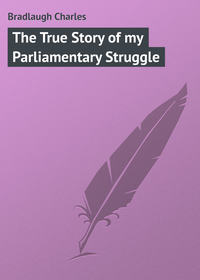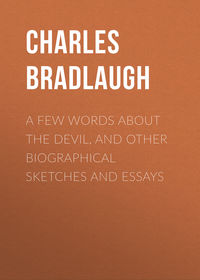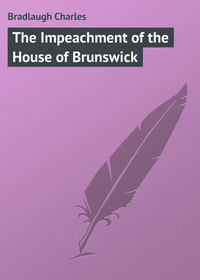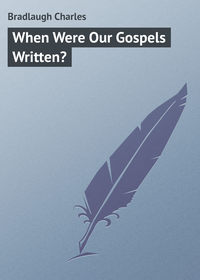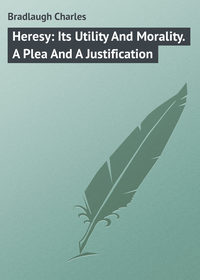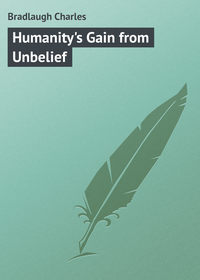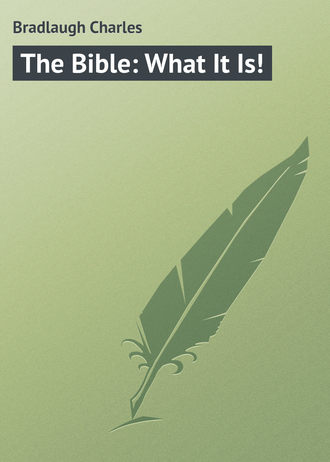 полная версия
полная версияThe Bible: What It Is!
The Scripture Reader departs, and wends his way to Ebenezer Chapel. This chapel is situate in a narrow street, between a sugar-baker's and a soap-boiler's premises, and he cannot help regretting, as he smells the foul exhalations from the sewer-grating, and the overcrowded grave-yard, that it is unlawful to stroll into the green fields on the Lord's-day.
The bell-ringer, the grave-digger, the priest, the sexton, the choristers, the organist, the organ-blower, the beadle, the pew-opener, the bishop, the bishop's coachman, and groom, all ply on the Sunday their several avocations without fear or threat of punishment; but if John Thomas on that day, instead of driving my lord bishop to church, and afterwards retiring to a neighbouring mews, to smoke his pipe in an orthodox manner, until service is over, were to drive into the green fields, or wander by the river side, he would most assuredly bring upon himself denunciations of future damnation. By the fruit ye shall judge of the tree. The fruit of this Sunday tree has been hypocritical, outside show, a false and empty parade of Bibles and gilt-edged prayer-books, grim faces, and constrained manners – this some people call religion.
Chapter xvi. contains the history of a rebellion on the part of Korah, Dathan, Abiram, and On, against the authority of Moses, connected with which there are several curious features; the rebels are swallowed up and consumed by an explosion and fire, which of course is sent by the Lord; but as Moses took a whole day to make the necessary preparations, it is quite possible to account for the destruction of Korah and his party in a more comprehensible manner. It is apparent that Moses had a direct interest in the destruction of these men, who wished to share the power he had arrogated to himself.
By verses 29 and 30 it is clear that the manner of their destruction was pre-arranged by Moses; and it is also clear that the Israelites themselves took this view of the matter, for in verse 41 we find them charging Moses and Aaron with having killed the people of the Lord.
Chapter xvii., w. 1 to 8. This miracle of Aaron's rod budding amongst the other rods was easy of accomplishment, when we remember how carefully the tabernacle was guarded by Moses and his priests, who had every facility for changing one rod for a branch from a fruit bearing tree. The rod, according to this account, budded, blossomed, and bore fruit, all within twenty-four hours.
Verse 6 says, there were 'twelve rods, and the rod of Aaron was among their rods.' The Douay says, 'there were twelve rods, beside the rod of Aaron.'
Verses 12 and 13. These verses are a sufficient evidence of the care taken bv Moses to prevent the people inspecting too closely his thaumaturgic tabernacle.
Chapter xviii., v. 15. See chap, iii., vv. 12 and 41. There is some confusion in these texts, as by the latter it was only the surplus number, beyond the number of the Levites, who were to be redeemed with money – here all are to pay the five shekels.
Verses 20 to 24. It is much to be regretted that our priests never imagined that this part of the revelation had any personal relation to them; great attention has been paid to the tithe part of the Book, but our reverend pastors have most wonderfully overlooked the part which says, 'Thou shalt have no inheritance in their land.' This, they say, only applies to the Jews. On what principle, then, does any part of the Book apply to the Gentiles?
Chapter xix. contains a direction to the priest to burn a red heifer, the ashes of which heifer become water, by a process not described; or rather if the writer had condescended to be explicit, I suppose he means that the ashes are to be mixed with water, this water is a kind of holy water, with which every unclean person is to be sprinkled, under pain of death. Amongst a people numbering 5,000,000, some must have had great difficulty in getting access to this water, especially those residing at a great distance from the place where the ashes were kept.
Chapter xx. In the Douay translation of v. 6, Moses and Aaron say, 'O Lord God, hear the cry of this people, and open to them thy treasure, a fountain of living water, that being satisfied, they may cease to murmur.' These words are entirely omitted in our version, and it would seem that some other portion of the original account must be lost, as we find the Lord reproaching Moses and Aaron for their exhibition of unbelief, of which we have no account here.
Verses 10 and 11. This is a miracle. Voltaire says: —
'A miracle, according to the true meaning of the word, is something admirable; and agreeably to this all is miracle. The stupendous order of nature, the revolution of a hundred millions of worlds round a million of suns, the activity of light, the life of animals, all are grand and perpetual miracles.
'According to common acceptation, we call a miracle the violation of these divine and eternal laws. A solar eclipse, at the time of the full moon, or a dead man walking two leagues, and carrying his head in his arms, we denominate a miracle.
'Many natural philosophers maintain that in this sense there are no miracles, and advance the following arguments: – 'A miracle is the violation of mathematical, divine, immutable, eternal laws. By the very exposition itself a miracle is a contradiction in terms: a law cannot at the same time be immutable and violated. But they are asked, cannot a law, established by God himself be suspended by its author?
'They have the hardihood to reply that it cannot; and that it is impossible a being, infinitely wise, can have made laws to violate them. He could not, they say, derange the machine, but with a view of making it work better; but it is evident that God, all-wise and omnipotent, originally made this immense machine, the universe, as good and perfect as he was able; if he saw that some imperfections would arise from the nature of matter, he provided for that in the beginning; and accordingly he will never change anything in it.
'Moreover God can do nothing without reason; but what reason could induce him to disfigure, for a time, his own work?
'It is done, they are told, in favour of mankind. They reply, we must presume, then, that it is in favour of all mankind; for it is impossible to conceive that the divine nature should occupy itself only about a few men in particular, and not for the whole human race; and even the whole human race itself is a very small concern; it is less than a small ant-hill, in comparison with all the beings inhabiting immensity. But is it not the most absurd of all extravagances to imagine that the Infinite Supreme should, in favour of three or four hundred emmets on this little heap of earth, derange the operation of the vast machinery that moves the universe?
'But, admitting that God chose to distinguish a small number of men by particular favours, is there any necessity that in order to accomplish this object he should change what he established for all periods and for all places? He certainly can have no need of this inconsistency, in order to bestow favours on any of his creatures: his favours consist in his laws themselves: he has foreseen all, and arranged all, with a view to them. All invariably obey the force which ne has impressed for ever on nature.
'For what purpose would God perform a miracle? To accomplish some particular design upon living beings? He would, then, in reality, be supposed to say – I have not been able to effect, by my construction of the universe, by my divine decrees, by my eternal laws, a particular object. I am now going to change my eternal ideas and immutable laws, to endeavour to accomplish what I have not been able to do by means of them. This would be an avowal of his weakness, not of his power; it would appear in such a being an inconceivable contradiction. Accordingly, therefore, to dare to ascribe miracles to God, is, if man can in reality insult God, actually offering him that insult. It is saying to him, You are a weak and inconsistent being. It is therefore absurd to believe in miracles; it is, in fact, dishonouring the divinity.'
Verses 23 to 29. Aaron's death is rather curiously related; it was certainly a sudden death, and the account almost conveys the idea that Moses and Eleazer killed Aaron in the mount.
Chapter xxi., vv. 1 to 3, have been before noticed; in addition it is only necessary to observe, that the Israelites could scarcely have destroyed the cities of the Canaanites, until they had entered the land of Canaan, into which it is alleged they did not go in the lifetime of Moses.
Verses 8 and 9. See Exodus, chap, xx., v. 4. Dr. Giles observes: —
'The reason why God commanded Moses to adopt this course has not been recorded; but the fact would probably be susceptible of a satisfactory explanation, if we were acquainted more fully with the serpent-worship which existed among the ancient people of Egypt. In the absence of certain information, it may be supposed that the Israelites had been taught to hold serpents in great respect whilst they were in Egypt, and that Moses availed himself of their superstition to bend them the better to his will.'
In our version, verse 8, Moses is told to make a 'fiery serpent:' in the Douay, he is told to make a 'brazen serpent' – fiery serpents are very rare animals.
Verse 14. 'The Book of the wars of the Lord.' What book is this? Who was the author of it? What has become of it? Was it inspired? Was it more ancient than the Pentateuch? In answer to all these questions, we can say but little, except this, that the book referred to is one of several books quoted from in our Bible, and now lost; the authorship is unknown; it must have been a well-known book at the time Numbers was written, and, consequently, more ancient than Numbers. There are many other books quoted from, which are also lost.
The following is from the 'Hebrew Records,' in reference to this subject: —
'In St. Paul's Epistle to the Hebrews, ix., 19, we read thus: —
'"For when Moses had spoken every precept to all the people, according to the law, he took the blood of calves and of goats, with water and scarlet wool, and hyssop, and sprinkled both the book and all the people."
'The writer of this epistle must also have had more sources of information than we now possess; for the account which he gives in the verse before us does not exactly tally with any of the various verses in the Levitical Law, where the subject is related. Nothing is said of the "book" being sprinkled with the blood, even if the other parts of the description are allowed to bear a sufficient resemblance.
'Another remarkable instance bearing upon my present argument, is the account which St. Jude gives of a contest between Michael and the Devil: —
'"Yet Michael, the archangel, when contending with the Devil he disputed about the body of Moses, durst not bring against him a railing accusation, but said, 'Lord rebuke thee!'"
'It is not known to what St. Jude alludes in this verse; nothing is said in the Old Testament of any contest between the Devil and the archangel Michael.
'In St. Paul's Second Epistle to Timothy, chap, iii., v. 8, are found the names of two of the magicians who competed with Moses in magical arts in the presence of Pharaoh, King of Egypt.
'"Now, as Jannes and Jambres withstood Moses, so do these also resist the truth; men of corrupt minds, reprobate concerning the faith."
'It is presumed that the names, "Jannes" and "Jambres," not found in the Books of Moses, became known to St. Paul through the medium of other writings, in which many particulars of Jewish history were recorded, but now no longer in existence.
Several circumstances of the life and acts of Moses are known to us, only because they are noticed in the New Testament, no mention being made of them in the old Jewish Scriptures. For instance, in Acts vii., v. 22, etc., we are told that —
'"Moses was learned in all the wisdom of the Egyptians, and was mighty in words and deeds. And when he was full forty years old, it came into his heart to visit his brethren of Israel, etc."
'But in the Book of Exodus the account of these things is much shorter, and nothing is said of the age of Moses at the time referred to.
'Neither is there any authority in the Pentateuch for the remark which occurs in Hebrews xi., 24: —
'"By faith Moses, when he came to years, refused to be called the son of Pharaoh's daughter."
'These circumstances make it probable that there were other original records in the time of St. Paul, which have since perished.
'This conclusion is supported by the admitted fact that many books which have perished are quoted in the Old Testament itself. Such are the books of Jasher, Enoch, the Wars of the Lord, and many others.
A perplexing train of argument opens to us from a consideration of these facts. If the books which have perished were of value, why have they perished? If they were of no value, why have valuable writers, like St. Paul, quoted them? It is supposed that they were of inferior authority, but this point has not been proved. If the existing books are genuine relics of a high antiquity, yet some of the lost books were more ancient still. The same Providence which has preserved the one has suffered the others to sink, even though those which have floated down the stream of time are imperfect on many points, which the others would have supplied.
Chapter xxii., v. 1. 'On this side Jordan:' the Douay has it 'beyond the Jordan:' the Hebrew is [ – ] (beyond, across, over, or on the other side), see also page 6. It is evident in this case either that the translators must have falsified the text to support their theory that Moses was the writer of the book, or that there is a very extraordinary coincidence of error. The whole of this subject has been carefully examined in Dr. Giles's 'Hebrew Records,' pp. 284 to 289.
Chapters xxii., xxiii., and xxiv. It is not at all wonderful that the barbarous Midianites and Moabites should have looked upon Balaam as a prophet, whose curse or blessing would affect the success of the Jews. In the dark ages we have many instances of persons revered by the people of their countries, because they were believed to possess supernatural powers; but is an inexplicable matter when we find the superstitions of the ignorant people shared by God himself. God communicated with Balaam. God said, 'Thou shalt not curse this people.' God came to Balaam repeatedly; at first he forbade him to go to Balak, and afterwards gave him permission; and then God's anger is kindled because Balaam, in consequence of such permission, went with Balak's messengers, and the angel of the Lord is sent to stand in Balaam's way. I have remarked upon angels in pages 33 and 34; those who wish to read more orthodox comments are referred to Dr. Pye Smith's 'Christian Theology,' p. 327. This angel is invisible to the wise man, Balaam, but is at once perceived by his ass. Is this intended as a covert sneer? Did the writer mean that asses are always the first to perceive invisible angels? The angel has 'his sword drawn in his hand' – this sword (being also only visible to the ass), must have been (like Macbeth's dagger) manufactured from different material from the swords commonly in use. The ass obstinately refusing to go forward (and asses very often do refuse to go forward, rather staying because a church, an angel, or a Bible stops the way, than progressing with Freethinking searchers toward the truth), is beaten by Balaam. The ass indignantly remonstrates, inquiring why he is beaten; and as Balaam manifested no surprise whatever when his ass spoke, we must conclude that the phenomenon was not entirely new to him. The fable concludes by relating that Balaam blessed the Jews, instead of cursing them.
Chapter xxiii., v. 19. According to the Bible account, God has repented several times (Genesis, chap, vi., vv. 6 and 7; Exodus, chap. xxxii., v. 14; 1 Samuel, chap, xv., v. xi.; 2 Samuel, chap. xxiv.,v. 16).
In chap, xxiv., v. 15, our version reads, 'The man whose eyes are open hath said: 'the Douay has it,' The man whose eye is stopped up hath said: 'the Breeches Bible renders it, 'The man whose eyes were shut up hath said.'
Chapter xxv., v. 4. See Deuteronomy, chap, iv., v. 31, 'The Lord thy God is a merciful God.'
Verse 9. '24,000.' In 1 Corinthians, chap, x., v. 8, the number is given as '23,000.'
Chapter xxvi., vv. 10 and 11. The Douay says, 'And there was a great miracle wrought; that when Core (Korah) perished, his sons did not perish.' Our version omits the miracle, out says, that 'the children of Korah died not:' yet in chap, xvi., vv. 32 and 33, we are told that 'the earth opened her mouth, and swallowed them up, and their houses, and all the men that appertained unto Korah, and all their goods, they and all that appertained unto them, went down alive into the pit, and the earth closed upon them, and they perished from among the congregation.'
Verse 12. 'Nemuel' is called 'Jemuel' in Genesis, chap, xlvi, v. 10.
Verse 13. 'Zerah' is called 'Zohar' in Genesis, chap, xlvi., v. 10.
Verse 16. 'Ozni' is called 'Ezbon' in Genesis, chap, xliv., v. 16. Verse 23. 'Pua' is called 'Phuvah' in Genesis, chap, xlvi., v. 13.
Verse 24. 'Jashub' is called 'Job 'in Genesis, chap, xlvi., v. 13.
Verses 64 and 65. Phinehas and Eleazar at least were left, if no more than they entered the promised land (vide Joshua, chap, xiv., v. 1, and chap, xxii., v. 13).
Chapter xxvii., v. 14. We have no account whatever of any rebellion by Moses. In Exodus, chap, xvii., it is the people who rebel against Moses.
Chapter xxxi. gives an account of the slaughter of the Midianites, and the destruction of their 'cities' and 'goodly castles' by 12,000 Jews, and the capture of 32,000 virgins, 675,000 sheep, 72,000 oxen, and 61,000 asses. The number or slain is not given; but it is easy to ascertain a minimum, if we reckon to each virgin for father, mother, brother, married sisters and their husbands, and other married females and their husbands, an average of four persons – which I conceive will be an estimate much under the true amount – we shall find 128,000 to have been slaughtered by 12,000 Jews, which is a statement rather difficult to believe. This difficulty is increased when we remember that the Midianites dwelt in 'cities' and 'goodly castles,' under shelter of which they could have contended against the attacks of the Jews. After all this fighting, the tired warriors must have had considerable trouble (especially if the captives resisted) in bringing back the spoil, which averaged to each man (supposing that all the Jewish soldiers had escaped unhurt) three virgins, fifty-six sheep, six oxen, and five asses, besides gold, silver, lead, iron, tin, brass, jewels, and other spoil. The Jews, however, were mighty warriors; and it has been previously noticed how two men slaughtered the whole of the inhabitants of a city,(see page 41). I am compelled to add, that verse 7, which says that the Jews slew 'all the males,' must be positively untrue, because if all were killed except the 32,000 virgins taken captive, there would be an end to the Midianitish nation; while in Judges, chap, vi., we actually find the Midianites more powerful than the Israelites.
Verse 16. This 'counsel of Balaam' is never mentioned before.
Verse 18. Is not this command likely to produce a repetition of the offence mentioned in chap, xxv., and for which the Israelites were so heavily punished?
Chapter xxxii., v. 40. 'Machir' must be a mistake, as he must have been dead long since (vide Genesis, chap. 1., v. 23); he could hardly have lived long enough to see his own progeny number 52,700 (vide chap, xxvi., v. 34).
Chapter xxxiii., v. 4. 'Upon their Gods also the Lord executed judgments.'. What judgments were these? and, if there is only one true God, were these judgments executed upon the mock gods of the Egyptians? If this be so, the whole is a farce upon the face of it, without deeper investigation.
Chapter xxxv., v. 14. 'On this side Jordan:' the Douay reads, 'beyond the Jordan:' the remarks on page 77 apply equally to this text.
Numbers is presented to us as a history of the wanderings of the Israelites during nearly forty years, with an account of some of the wars in which they were engaged. It professes to be the work of the same writer as the Book of Genesis; and in this respect its pretensions at once fail, for it is not at all probable that one man would make such strange variations in writing the names of the persons referred to on page 78. It cannot be revelation from God – 1st. Because it contains a variety of errors, as in the names just alluded to, or in the times of service of the Levites; or in the destruction of the children of Korah, etc., etc. 2nd. Because it pictures a God of great mercy and long suffering, ordering an indiscriminate and merciless slaughter, as in the case of the Midianites. 3rd. Because it assumes that the curse or blessing of Balaam would affect the welfare of the Israelites, and represents an omniscient and immutable Deity as forgiving or punishing sinners according as they sprinkled, or neglected to sprinkle, themselves with water, in which had been mixed the ashes of a burnt red cow. 4th. Because it is wholly, or in some part, compiled from other and earlier writings, and, therefore, was not an original. As a narration of events, it must be regarded with extreme suspicion. The numberings of the Jews in chapter i., I cannot help considering as suppositious; and the account of the wholesale slaughter of the Midianites is evidently untrue. As an educational book, it is entirely without merit, and affords neither instruction nor amusement to its reader, unless, indeed, he be of a sufficiently depraved character to enable him to find amusement in adding together the thousands of Israelites slaughtered by God, or in calculating the probable number of the Midianites slain by the children of Israel.
BOOK V. DEUTERONOMY
Chapter i., vv. 1 and 5 (see page 6), 'On this side Jordan:' the Douay has i beyond the Jordan' in each instance.
Verse 10. 'Ye are this day as the stars of heaven for multitude.' Yet we are told in chap, vii., v. 7, that God chose the Jews because they were the' fewest of all people.'
Chapter ii., v. 30. 'The Lord thy God hardened his spirit, and made his heart obstinate.' The 'hardening of heart' has been remarked upon in pages 50 and 52, in the case of Pharaoh. It is useless to fill the work with mere repetitions; but I feel bound to draw attention again to such texts as this, which clearly demonstrate, to even the most obtuse mind, that the Book cannot be a revelation from an immutable Deity. That a merciful and loving God should harden any man's heart is unreasonable in the extreme; and that he should do it for the purpose of affording an excuse for slaughter, is a blasphemous proposition, which every Theist ought to deny. Can men wonder that Atheists grow in number, when the character of the Deity is delineated in such a contradictory and absurd manner? A just God grossly unjust, a merciful God cruel in the extreme, an immutable God constantly changing; in fact, a God consistent only in the attribute of incomprehensibility!
Chapter iii., v. 11. '"For only Og, King of Bashan, remained of the remnant of giants; behold, his bedstead was a bedstead of iron: is it not in Rabbath of the children of Ammon? nine cubits was the length thereof, and five cubits the breadth of it, after the cubit of a man."
'Dr. Pyle (in the Family Bible) remarks on this passage: —
'"It is probable that either Og conveyed his iron bedstead, with other furniture of his palace, into the country of the Ammonites, to prevent their falling into the hands of the Israelites; or else the Ammonites had taken it from him in some former conquest, and kept it as a monument of their victory."
'Either of these cases would be probable, if it could be first proved that Moses wrote this verse, and that he knew of Og's bed being kept in Rabbath. But as Rabbath was not taken by the Israelites until the time of David, as we read in 2 Samuel, xii., 26, '"And Joab fought against Rabbah, of the children of Ammon, and took the royal city."


